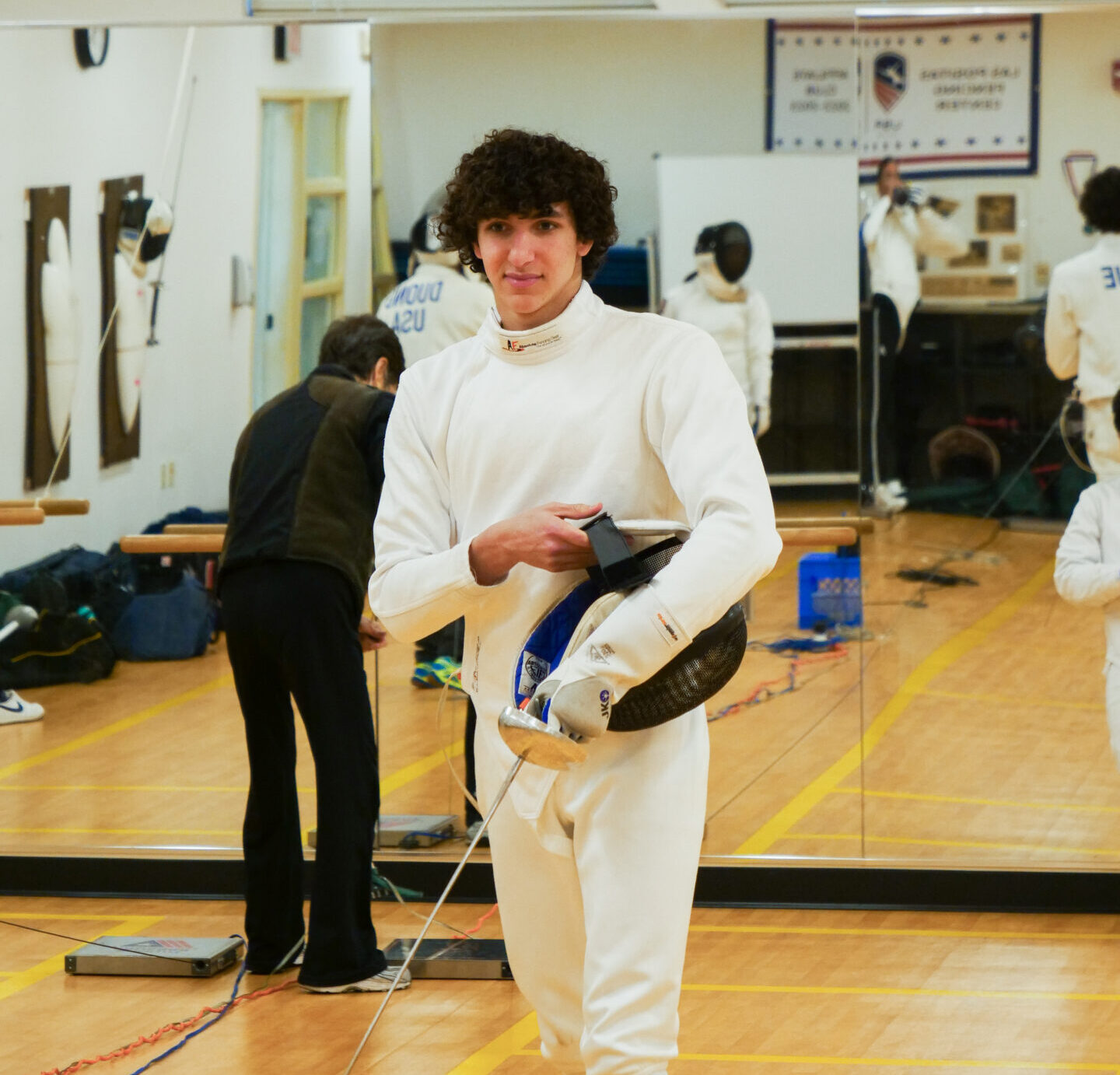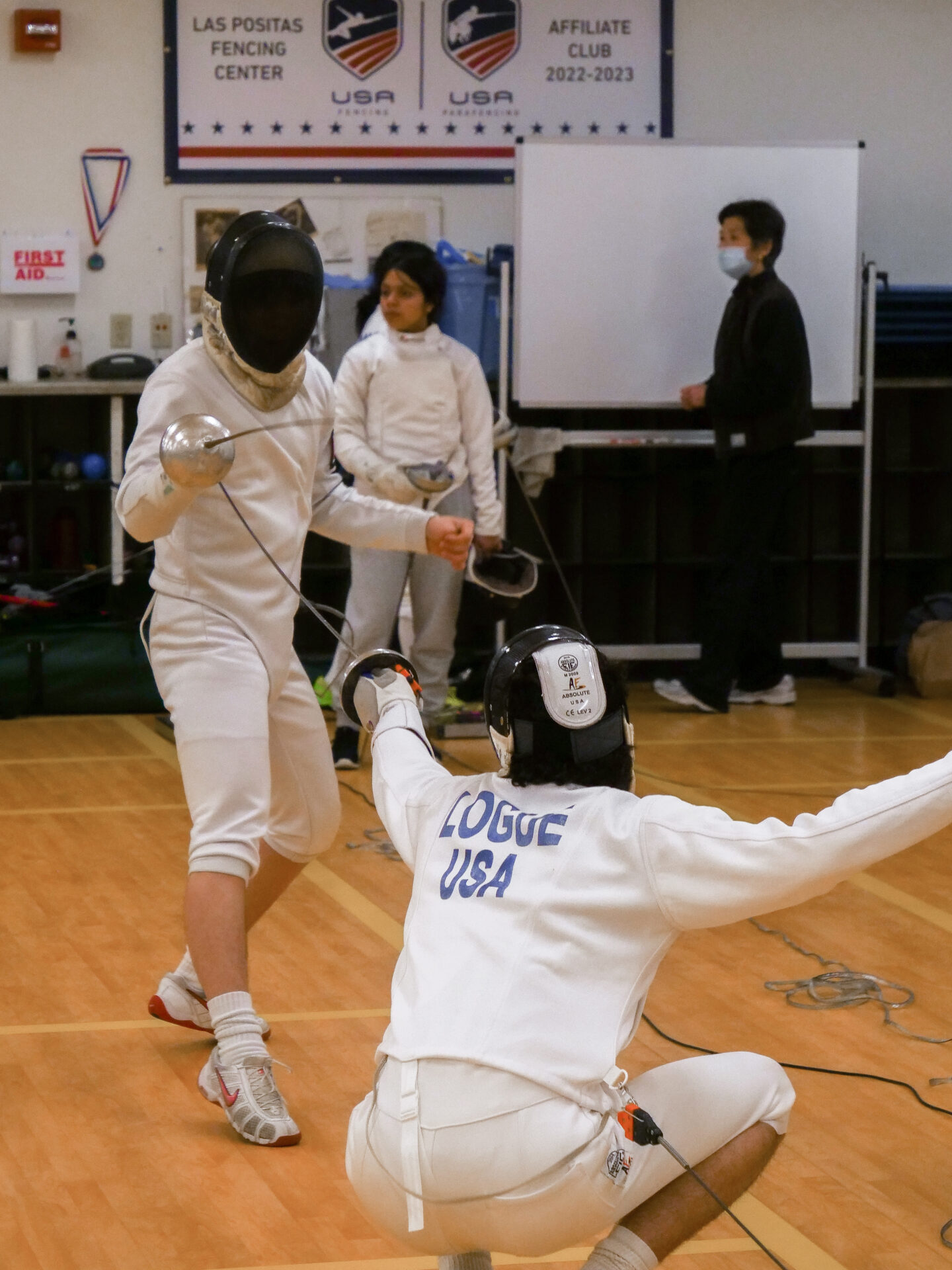In the year 2014, the screen lit aglow with shadowy figures, a cautionary horn sounding in the background. From a tiny metal hilt, blue plasma energy emitted into a sword, grasped in a scrappy boy’s hands. Towering over him, a man with black robes grasped the same sword, but in red. The two force wielders emerged into a clash. Drums rising, the two blades crashed against each other with swift power.
Outside the screen, young brothers held their breath as their eyes filled with admiration and wanting. They shook their plastic lightsabers — careless, clumsy.
For eight-year-old Ethan Logue, Star Wars initiated his path toward fencing excellence.
“We did lightsaber fighting with just plastic lightsabers. And I guess my mom got a little bit tired of it, and she wanted to find a better outlet to put that into,” Ethan said. “So somehow, she found fencing.”

Now, at 17 years old, the fencer has taken the No.13 spot in California and is ranked top 100 nationally for Junior Epee. Ethan, a Monte Vista High School student, walks the halls of the Las Positas gymnasium as if it were home.
It is a second home. A place where he can unwind and give all his focus toward his sport. And that’s thanks to the fencing club at LPC.
The Las Positas Fencing Club was founded in 2005, with Coach Sophie Rheinheimer at the helm. Near the top of the campus hill, inside the towering walls of the Tony Costello Gym, fencers from just 8 to retirement age share a space. It’s a mirrored wood-slabbed room, designed for dance practice. Unlike other clubs that might have over 100 members, there are only around 20 here.
Every Tuesday and Thursday, the scrape of shuffling across the floor resounds. Two metal points clang. Cheering after the electrical buzz, signaling a fencer scored a point. This is a place of joy, no matter your experience or skill.
Which is unusual. Competitive fencing is a do-or-die kind of world, and many bigger clubs take that approach with their students. Even at 8 years old, competitive fencers feel the pressure. But the fencing taught through the LPC club is different.
“Everybody’s super supportive. If anybody tries to talk anybody down, that never flies. So I think a lot of clubs don’t have that aspect. Especially because they’re so big, they can’t care for each individual person,” Ethan said.
Ethan doesn’t seem like a national fencing star at first glance. He’s a bit timid and unassuming. His brother and coach describe him as quiet. But like a hidden goliath, he shows off on the fencing strip.
“He’s a very relaxed, confident, aggressive fencer. He’s not wild, but he’s very methodical. He works his way in, and he’s left-handed, so that’s an advantage,” Rheinheimer said.
“He’s really good at that, keeping the right distance in order to be able to draw them in and attack them when their guard is down,” Ethan’s brother and former fencer for LPC Andrew Logue, said.
“Whenever I fence him, he already has me figured out. He knows when I do something, he knows how to respond and he knows how to counter my attacks,” Shawn Seo, fellow club fencer and Dublin High School student, said.
The stress of championing his titles doesn’t show when Ethan speaks about fencing. He is an athlete with a healthy approach to his sport. He knows it isn’t what completes him.
“It doesn’t actually matter if I lose or not, like it’s not the end of the world. It’s just a learning experience,” Ethan said.
He had to struggle to get to that point, though. For the first three years of his competitive fencing career, he lost his bouts in the first round of direct elimination. Sometimes he’d leave the state to compete in a tournament and come home after only fencing one round.
“I didn’t really see the progression or where it could really go at that point,” Ethan said.
“When he was younger and he lost, he was just Mr. Grump,” Rheinheimer said. “I knew well enough to leave him alone. Let him wander off, do whatever he needs to do. And he eventually comes back and then we talk.”
It was right before the pandemic when he saw a stark improvement in his fencing.
“He would often lose many times, but then there were increasingly more and more times where he would go up against very, very high rated fencers and he would beat them. They would be really confused,” Paul Louge, Ethan’s father, said.
That confusion was in part due to the Las Positas Fencing Club being lesser-known. Other fencers would often underestimate Ethan because the club was small, from a community college and coached by a woman, Paul said.
When the pandemic started, athletes everywhere panicked. Ethan thought he wouldn’t be able to compete again with the same intensity or power. He couldn’t attend practices in the gym since the Las Positas Community of Practice, through which fencing classes are taught, didn’t allow religious exemption for vaccinations.
But unwilling to give up, Ethan and other fencers in the club formulated a plan to continue practicing. There came the invention of “barn fencing.”
Ethan repurposed his family barn with rubber fencing mats and scoring boxes, right next to a stall of donkeys and horses. Every Saturday for a few months, the club would meet there with Coach Rheinheimer.
“He just wants his entire club to improve and be ready,” Seo said.
Now, almost everyone in the club has a national rating. Competitive fencing has classifications from “A” to ”E,” dictating the skill-level of a fencer. “A” ratings mean a fencer is at the top of their age division, contending at Division 1 tournaments.
Since 2022, Ethan has been an “A”-ranked fencer. This competitive year he’s secured 105 victories and 48 losses.
“One of the hardest parts of training a fencer is to instill that confidence in them. And Ethan finally figured it out,” Rheinheimer said.
Ethan is the first fencer from the LPC club to be accepted into a NCAA Division I college for fencing. Sacred Heart University, a private Catholic school in Fairfield, Connecticut, offered what Ethan wanted. They have a similar nurturing fencing environment like Las Positas.
He plans to major in computer science with a music minor and will join with a sports and merit-based scholarship.
“The next step after NCAA, really, the only place you can go, is Olympics, which is a really big jump,” Ethan said. “It’s very time consuming and not very well paying, which is just the reality.”
But just like he took a chance on fencing, persisting despite defeat, he’d take a chance on the Olympics too.

Lizzy Rager is the editor-in-chief of the Express. Follow her @ragerwriter.

